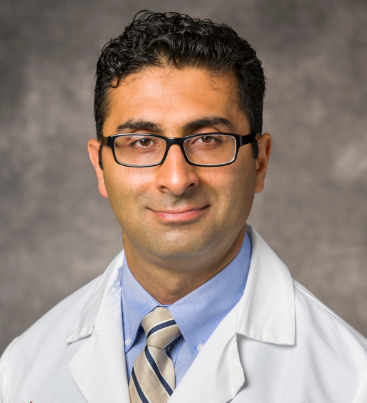Personalized Medicine: A Real Option for Multiple Myeloma Patients
January 24, 2017
Individualized vaccine is created from each patient's unique cancer cells
Innovations in Cancer - Winter 2017 - View Full PDF
The 2015 approval by the U.S. Food and Drug Administration of two new monoclonal antibodies – elotuzumab (Empliciti®) and daratumumab (Darzalex®) – and an oral proteasome inhibitor – ixazomib (Ninlaro®) – has given new hope to patients with multiple myeloma. At University Hospitals Seidman Cancer Center and just over a dozen other centers nationwide, all multiple myeloma patients with relapsed disease have access to these new therapies. But they also have access to another experimental option: a personalized myeloma vaccine.
 Ehsan Malek, MD
Ehsan Malek, MD“Preclinical and clinical data indicate that myeloma-associated tumor antigens elicit humoral and cellular immune responses in myeloma patients,” says Ehsan Malek, MD, Hematologist, University Hospitals Seidman Cancer Center, and Instructor of Medicine, Case Western Reserve University School of Medicine, participating in a trial of the new myeloma vaccine. “These findings strongly suggest that the immunotherapeutic strategies, such as immune checkpoint inhibitors, therapeutic myeloma vaccines and adoptive cellular therapies, are promising avenues of clinical research that may be most applicable in the minimal residual disease state following autologous hematopoietic stem cell transplant.”
At UH Seidman Cancer Center, all newly diagnosed, standard-risk multiple myeloma patients who are eligible for autologous stem cell transplantation are asked to participate in the myeloma vaccine trial. The Phase II, multicenter trial is sponsored by the Blood and Marrow Transplant Clinical Trials Network. Hematologist and oncologist Hillard Lazarus, MD, is the principal investigator at UH.
HOW IT WORKS
When a patient is diagnosed with multiple myeloma, UH physicians and scientists, in collaboration with investigators at Dana Farber Cancer Institute, use “treatment-naïve” cancer cells to create a dendritic cell vaccine to enhance the individual patient’s immune system, increasing its ability to recognize and kill myeloma cells. This vaccine is generated on-site at the Cellular Therapy Laboratory.
Importantly, the myeloma vaccine is personalized for each patient, based on his or her specific disease.
“Myeloma is among the most heterogeneous malignancies,” Dr. Malek says. “Therefore, strategies to use patients’ own tumor cells to generate a patient-specific myeloma vaccine are warranted. This is a big step toward precision medicine and individualized therapy for multiple myeloma patients. It’s important to make the immune system activated against the antigens expressed by a person’s particular cancer. That’s the exciting thing about personalized medicine.”
After the myeloma vaccine is created in the laboratory and the patient undergoes an autologous stem cell transplant, he or she receives the vaccine – designed to stimulate his or her own T cells against the myeloma. Before doctors inject a patient, vaccine function is scrutinized to determine whether it is capable of stimulating T cells recognizing the myeloma cells.
OTHER MYELOMA PROJECTS IN THE PIPELINE
Dr. Malek and his colleagues at UH Seidman Cancer Center are also working on natural killer cell therapies for multiple myeloma, as well as other hematologic malignancies. They hope to have a new trial open soon. Also, they’re collaborating with physicians and scientists from Cleveland Clinic – their partners in the Case Comprehensive Cancer Center – to develop and test another myeloma vaccine, this one targeted against the myeloma antigen DKK. This project is led by UH’s Dr. Lazarus in collaboration with Fred Reu, MD, and Qing Yi, MD, from Cleveland Clinic.
For more information on treatment for multiple myeloma at UH, including the personalized vaccine, or to refer a patient, please email CancerInnovations@UHhospitals.org.
Tags: Myeloma


